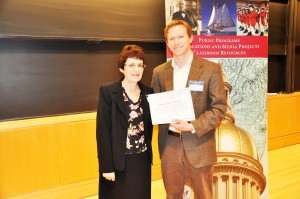By Catherine Michaelsen
Correspondent
When he’s not teaching history at the College, Associate Professor Robert McGreevey enjoys reading, watching films, traveling, biking and exploring with his 6-year-old son.
But it’s his passion for history and his ability to foster similar enthusiasm in his students that earned McGreevey the title of Teacher of the Year from the New Jersey Studies Academic Alliance.
After reading papers written by students in McGreevey’s spring 2011 seminar on 20th century Trenton, NJSAA members and Celia Chazelle, the College’s history department chair, nominated McGreevey for his implementation of N.J. history in the classroom.
“I’m honored. I should share the award with my students, all of whom did great work,” McGreevey said.

He also wished he could share it with Wendy Nardi, archivist of the Trentoniana Collection at the Trenton Public Library. Nardi “really opened the door to her archives for us,” he said.
Nardi directed McGreevey to an unprocessed collection of documents from the Trenton Committee for Unity, a group of Jewish and African-American activists that sought to confront racism and anti-semitism in Trenton during the 1940s and ’50s.
McGreevey’s seminar group of 15 students gathered in Trenton’s library to explore and organize the collection while developing original, archive-based projects.
“We learned to do the work of real historians,” said Nicole Valdez, senior history major. “I felt a profound sense of ownership over my work because I was analyzing primary documents that had never been written about before.”
McGreevey developed the idea for a hands-on, research-based class while teaching at Tennessee’s Vanderbilt University, where he experimented with a course on 20th century Nashville.
“It was such a success that I wanted to try something like that as soon as I got here,” he said.
Since starting at the College in 2009, McGreevey taught late 19th and early 20th century American history, specializing in the Gilded Age and Progressive Era. He is also interested in connections between America and the world and the history of cities.
McGreevey’s enthusiasm for Trenton’s history has left a lasting impact on his students.
Trevor McLaughlin, senior history and secondary education double major, learned to look at Trenton from a global perspective.
“(McGreevey) showed us how the city of Trenton served as a microcosm of larger events, including white flight and desegregation occurring in many other Northern urban centers,” McLaughlin said.
Another student, Autumn Dilley, developed an interest in local history while taking the course.
“It was because of this seminar actually that I decided to pursue an internship at the Trentoniana Archive Collection last summer,” the senior history and music double major said.
In addition to earning Dilley an internship, the experience inspired her to pursue a master’s degree in library science with a focus on archival work.
McGreevey was similarly influenced by his history professors during his undergraduate years at Swarthmore College.
“I just had such respect for what they did,” he explained.
After earning a BA in history, McGreevey taught high school for three years before pursuing his MA and Ph.D. in American history at Brandeis University.
“After working a few years, it was very clear in my mind that I wanted to be a professor,” he said. “Some people feel a lot of pressure to jump right into grad school, but sometimes a career for a year or two can be really clarifying.”
McGreevey found his commitment to historical research and creative teaching at the College to be a great balance.
“I love TCNJ. Part of what stood out to me when I was interviewing was my colleagues, who are wonderful teacher-scholars,” he said. “Then when I came and saw the students that really sealed the deal because we have wonderful, bright students.”
According to Valdez, McGreevey definitely deserved the Teacher of the Year award.
“(McGreevey) challenges his students to think critically about the historical events and institutions that have shaped local history, helping them to gain a deeper understanding of the complexity and diversity of their own community and the origins of contemporary social issues,” she said. “In this way, his students not only become better historians, but also better citizens.”






